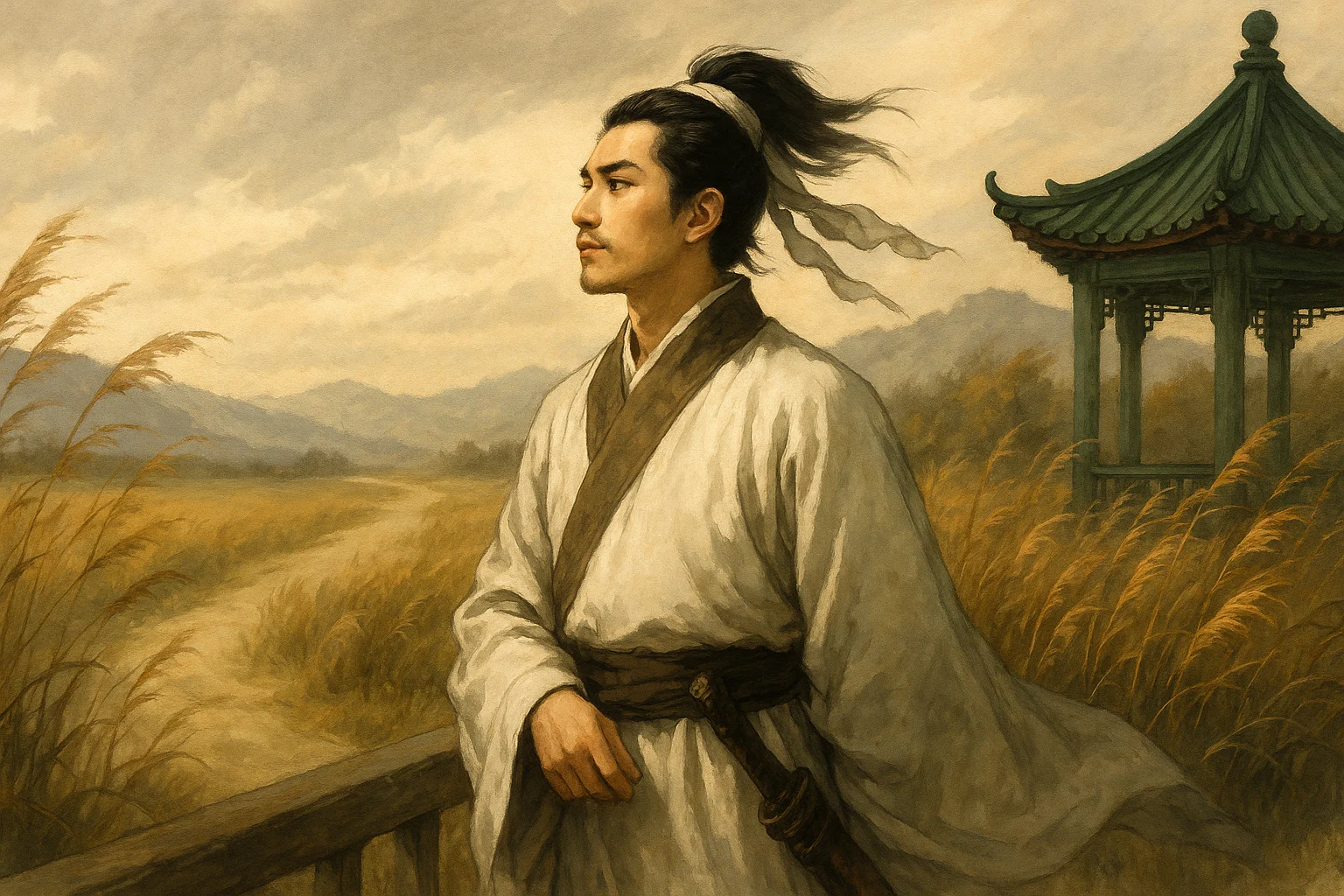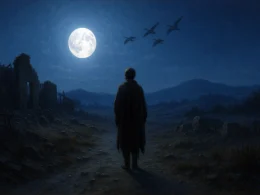They say that wildgeese, flying southward,
Here turn back, this very month...
Shall my own southward journey
Ever be retraced, I wonder?
...The river is pausing at ebb-tide,
And the woods are thick with clinging mist --
But tomorrow morning, over the mountain,
Dawn will be white with the plum-trees of home.
Original Poem
「题大庾岭北驿」
宋之问
阳月南飞雁,传闻至此回。
我行殊未已,何日复归来?
江静潮初落,林昏瘴不开。
明朝望乡处,应见陇头梅。
Interpretation
Composed around 704 AD during the Tang Dynasty, this poem was written by Song Zhiwen at Dayu Ridge North Station while en route to his exile in Shuangzhou after being implicated with Zhang Yizhi's faction. Facing both political ruin and geographical isolation as he journeyed from Chang'an to the Lingnan wilderness, the poet poured his anguish into these verses - a poignant meditation on the threshold between civilization and barbaric lands.
First Couplet: "阳月南飞雁,传闻至此回。"
Yáng yuè nán fēi yàn, chuánwén zhì cǐ huí.
In winter's depth, southbound wild geese fly; Yet legend says they turn back here, not I.
The poet contrasts nature's boundaries with human suffering: geese have their southern limit, while his exile stretches farther. The folkloric reference ("legend says") merges with personal tragedy, using the geese's turning point to emphasize Lingnan's perceived barbarity and his own boundless banishment.
Second Couplet: "我行殊未已,何日复归来?"
Wǒ xíng shū wèi yǐ, hé rì fù guīlái?
My journey stretches on without reprieve; When shall I ever return home, believe?
A crushing contrast to the geese's fate: "They stop, I proceed." The rhetorical question amplifies the exile's endless wandering, transforming migratory instinct into human helplessness against capricious fate.
Third Couplet: "江静潮初落,林昏瘴不开。"
Jiāng jìng cháo chū luò, lín hūn zhàng bù kāi.
River stills as tides begin their ebb; Jungle gloom where miasmas never web.
Painting Lingnan's ominous landscape: the receding tide marks night's arrival, while perpetual "miasmas" symbolize disease-ridden wilderness. These environmental metaphors externalize the poet's despair - nature's melancholy mirroring his oppressed psyche.
Fourth Couplet: "明朝望乡处,应见陇头梅。"
Míngzhāo wàng xiāng chù, yīng jiàn lǒng tóu méi.
At dawn when northward glances yearn, Only ridge-top plums shall greet my turn.
The imagined farewell: crossing the ridge into exile, "ridge-top plums" become bitter-sweet substitutes for homeland vistas. This final gaze northward transforms local flora into emotional relics, blending resignation with unspoken attachment in classic Tang restraint.
Holistic Appreciation
The poem embodies restrained yet profound emotion, using wild geese as a lyrical motif to articulate the poet's complex psychological state during southern exile. The opening couplets establish a poignant human-avian parallel, conveying the endless journey of banishment and uncertain return. Subsequent stanzas transition from landscape to emotion, where the receding river and lingering miasma mirror the poet's physical exhaustion and spiritual desolation. The concluding image of "Longtou plum blossoms" symbolically substitutes for unreachable hometown scenery, expressing both parting sorrow and nostalgic longing with exquisite subtlety. Through concise yet potent imagery, the work interweaves exile's grief, homesickness, and trepidation into a deeply moving poetic tapestry.
Artistic Merits
- Emotional Crescendo
The poem progresses from geese-inspired nostalgia to personal displacement ("my journey stretches on"), then through desolate landscapes ("calm river," "haze-shrouded woods"), culminating in the climactic "Longtou plum blossoms"—a masterful layering of sorrow, resignation, and unspoken farewell. - Precision and Subtext
With remarkable economy (28 characters total), each line carries dense symbolic weight. Avoiding direct lamentation, the poet conveys anguish through restrained natural imagery, particularly the understated yet devastating final plum blossom reference. - Psychological Nuance
Phrases like "geese rest while I journey on," "unlifting miasma," and "hometown-gazing place" embed complex emotions—solitude, melancholy, unspoken farewells—into landscape descriptions, demonstrating unparalleled psychological portraiture through objective correlatives.
Insights
This work reveals how authentic emotion and disciplined expression achieve profound resonance during life's trials. Rather than protesting injustice, the poet observes nature with quiet intensity, transmuting personal exile into universal meditation on displacement and return. The very absence of outcry amplifies the pathos. More than an exile poem, North of Dayu Ridge Post Station becomes a timeless lyric on life's turning points and the paradox of homecoming dreams—its emotional truth transcending historical context to speak across centuries. The plum blossom, simultaneously present yet unreachable, crystallizes this eternal human tension between reality and longing.
Poem translator
Kiang Kanghu
About the Poet

Song Zhiwen (宋之问, 656 – 712 CE), a native of Fenyang, Shanxi (some records suggest Lingbao, Henan). Song Zhiwen attained the jinshi degree in 675 CE. In 708 CE, he was reassigned as Vice Director (yuanwailang) of the Bureau of Evaluations (kaogong) and appointed an Academician of the Institute for the Advancement of Literature alongside Du Shenyan and Xue Ji, only to be demoted again to Vice Prefect (changshi) of Yuezhou for accepting bribes. In 710 CE, Song Zhiwen was exiled to Qinzhou, and Emperor Xuanzong ordered his execution in 712 CE.












